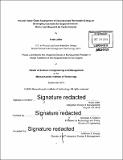Holistic value chain assessment of decentralized renewable energy in developing countries for impact investors : before and beyond life cycle analysis
Author(s)
Jaffer, Huda
DownloadFull printable version (18.50Mb)
Other Contributors
Massachusetts Institute of Technology. Engineering Systems Division.
Advisor
Nicholas A. Ashford.
Terms of use
Metadata
Show full item recordAbstract
As the world grapples with the idea of impact to deliver essential services to the poor, measurement of real impact and the deriving Typical investments are measured purely investments are more complex as they al sustainability. investment as one of the important ways many queries are being raised about maximum value for the money invested. on the basis of financials but impact so look into social and environmental One of the methods is to conduct Life Cycle Assessments on the products being sold in the developing countries to give impact investors a better understanding of the environmental sustainability of the products, services and systems being invested in. However, to maximize the return on investment from a holistic impact perspective, sustainability needs to be evaluated across social, financial and environmental parameters. To have a substantial impact one needs to build the corresponding ecosystems for under-served societies: thus making the measurement of impact more accurate. The thesis focuses on the above by taking the example of Decentralized Renewable Energy enterprises in poor and underserved markets of the developing world. The project explores existing methodologies and criteria for impact investors to finance companies by balancing social, environmental and financial returns. By benchmarking and reviewing relevant approaches designed to spur sustainability and by identifying needs and gaps in the chosen methodologies the thesis proposes guidelines for impact investors to assess holistic sustainability. An analysis is provided by considering aspects across type of products sold/services provided by enterprises, type of target segments and motivations, type delivery models, type of capital and type of organizational structure and human resources. The guidelines are designed to help impact investors and enable social enterprises to look at sustainability metrics beyond Life Cycle Assessments. Finally, the importance of revising tax treatment of impact investments and the financial returns deserves serious consideration in order to effectively impact sustainable change.
Description
Thesis: S.M. in Engineering and Management, Massachusetts Institute of Technology, School of Engineering, System Design and Management Program, Engineering and Management Program, 2016. Cataloged from PDF version of thesis. Includes bibliographical references (pages 180-207).
Date issued
2016Department
Massachusetts Institute of Technology. Engineering and Management Program; System Design and Management Program.Publisher
Massachusetts Institute of Technology
Keywords
Engineering and Management Program., System Design and Management Program., Engineering Systems Division.